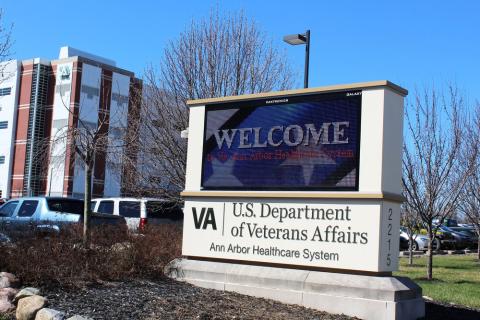At the end of June, President Trump signed into law a bill that would make it easier for subpar Veterans Affairs employees to be sacked, something that was problematic under previous administrations.
While the bill had bipartisan support, not everyone was happy, as they say the new law goes too far in usurping due process. The bill replaced an earlier executive order.
As of July 3, more than 500 employees had been fired and another 200 suspended for poor performance (many before the new law). Most were lower level employees, such as cemetery caretakers, nursing aides and claims assistants, though the list did include a police chief and a few doctors for good measure.
"As you all know all too well, for many years the government failed to keep its promises to our veterans. We all remember the nightmare that veterans suffered during the VA scandals that were exposed a few years ago," said President Trump at the signing of the bill.
"Veterans were put on secret waitlists, given the wrong medication, given the bad treatments, and ignored in moments of crisis for them. Many veterans died waiting for a simple doctor’s appointments. What happened was a national disgrace." - President Donald Trump
Everyone remembers the 2014 scandal in which veterans in Arizona were dying while on wait lists to receive medical care. The director of the VA in Arizona remained on the job and even received bonuses, despite evidence showing that she was complicit in covering up the scandal.
"Outdated laws kept the government from holding those who failed our veterans accountable," the president added.
Veterans groups, lawmakers, and veterans themselves applaud the bill, but some say it is unnecessary because, as the Adverse Action Report from July 3 shows, federal employees can indeed be fired, shattering the myth that they couldn't.
But the problem is that the process is so convoluted, it can take a substantial amount of time to meet the requirements of the Merit Systems Protection Board (MSPB), all while the employee remains in their job. The new law gives the VA secretary more leeway in firing problem employees.
President Trump campaigned on promises of swift and fundamental change for America's veterans, something he and his VA secretary, Dr. David Shulkin, seem to be keeping.
At a breakfast hosted by the Christian Science Monitor in June, Shulkin, who is a holdover from the Obama administration, compared the department under the two presidents.
"What I saw was improvement," Shulkin said.
He said he believed that former secretary Robert A. McDonald was making small positive changes. However, he went on to say "that slow and incremental steady change isn’t what this organization needs."
"[W]hat we need is bolder fundamental change dealing with the issues that frankly are really hard to deal with that go back decades. That means, by definition, we are going to have to take greater risk. That is part of what [President Trump] has asked us to do." - VA Secretary Dr. David Shulkin
Critics of the new accountability law say the bill takes a hatchet to due process rights for federal employees, and they say the Adverse Action Report proves that the VA can fire people just fine.
Joe Davidson wrote in a piece for the Washington Post that the law "erodes civil service due process protections for all VA employees and pointedly facilitates faster firing of department’s 469 senior executives."
Davidson adds, "Under the new accountability law, due process for VA employees, such as it is, will take less time and they can be bounced on less evidence."
But the question we must ask is, "Is that such a bad thing?"
The vast majority of the workforce of America is not afforded such lofty rights. If an employee is caught doing something wrong, that employee is reprimanded accordingly, even if that means losing one's job on the first offense. So why shouldn't VA employees be the same?
In addition to giving Shulkin carte blanche to fire employees, this same bill also provides protection to those who report negligence, waste or wrong doing within the VA, something that was problematic in the past.
Often these things went unreported because whistleblowers were afraid of reprisal. The law specifically prohibits this, including prohibiting whistleblowers from being demoted or terminated while a report is investigated. Contractors to the agency are covered as well.
The new law also mandates in-person training for every department employee every two years on how to effectively handle whistleblower reports and how to foster a work environment conducive to reporting problems.
Photo Credit: Barbara Kalbfleisch / shutterstock.com
